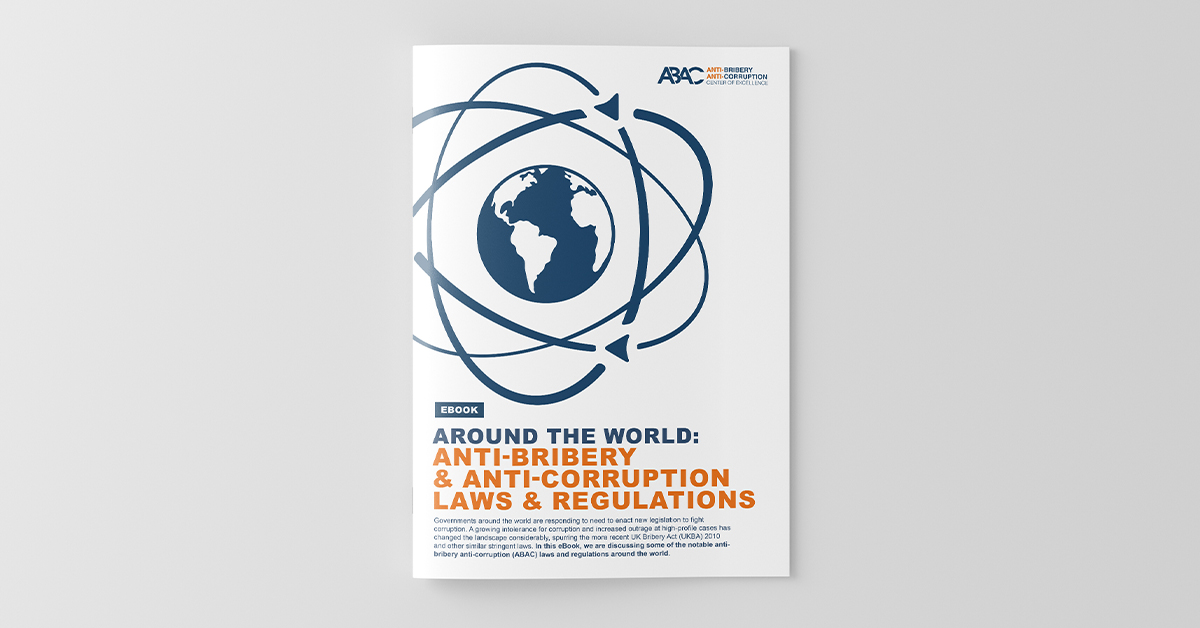In part 1 of this series, we discussed ABAC laws and regulations, including The United Nations Convention against Corruption (UNCAC), European Union Anti-Corruption Conventions, United Kingdom – UK Bribery Act (UKBA) 2010, France – Sapin II. In part two, we look at other laws and regulations in Germany, Russia, China and Malaysia. So let’s discuss it in detail.
Germany – Anti-Corruption Laws
Germany addresses bribery and corruption offenses in its Law on Fighting Corruption, its Criminal Code, and its Administrative Offences Act. The Criminal Code applies to individuals (persons), and the Administrative Offences Act enforces responsibility against companies. Similar to UKBA and Sapin II, companies or individuals that commit offences abroad can be prosecuted under German law.
Under Germany’s Criminal Code (Strafgesetzbuch) it is prohibited for a person to offer or accept a bribe – including so-called (facilitation payments). Punishments can be severe, including up to 10 years in prison plus fines. Company executives can themselves be held liable if they encouraged the action, or even just knew about it and failed to stop it. The Administrative Offences Act, on the other hand, enforces civil penalties for companies. Companies can be fined up to EUR 10 million for each intentional criminal offense. Negligent criminal offenses are punishable too, up to EUR 5 million for each negligent criminal offense. Penalties can be increased to include ill-gotten gains from bribery and corruption.
Russia – Federal Anti-Corruption Law
Under Russia’s Federal Anti-Corruption Law No. 273, Article 13.3, companies operating in the country must put into place anti-corruption programs, with specific, prescribed measures to prevent corruption as detailed in the law. Companies must also adopt procedures for cooperation with law enforcement, adopt an ethical code of conduct for employees, establish policies against conflicts-of-interest, and take other measures. In recent years, Russia has increased enforcement against bribery offences, and has strengthened legislation to be more in line with other European anti-corruption laws as well as the FCPA. Read more about Russian anti-corruption laws at Global Legal Insights.
Are you in a hurry or interested in more in-depth information? Just download our new ABAC Laws and Regulations Around the World Playbook now! Our Playbook goes into each of the laws and regulations and discusses the importance, mechanisms and action points to each.
China – Anti-Corruption Laws
China announced a war on corruption in recent years, and launched investigations and enforcement actions pursuant to that campaign. Most anti-corruption provisions are found in China’s Anti-Unfair Competition Law of the PRC and the Criminal Law of the PRC. Under the Anti-Unfair Competition Law of the PRC commercial bribery is prohibited and punishable by fines and sanctions, which can elevate to criminal investigations. Under the Criminal Law of the PRC, it is prohibited to give money or property to obtain an undue benefit. Penalties can be very severe, including the death penalty, for extreme cases. Government and business leaders in past, high-profile cases have suffered this fate. More common punishments include fines and imprisonment.
Malaysia – MACC Corporate Liability Provisions
Malaysia took a strong stance against corruption with the Corporate Liability Provisions of the Malaysian Anti-Corruption Commission (Amendment) Act 2018. Section 17A of the MACC Act 2018 enables the prosecution of individuals accused of corruption, not only organisations.
According to an article in the New Straits Times, under the provisions, an organisation’s “directors, controllers, officers, partners, or managers are deemed to have committed the same offence, which carries a maximum penalty of a fine of not less than 10 times the value of the gratification or RM1 million, whichever is higher, and 20 years’ jail unless the firm is able to prove that it had in place procedures designed to prevent corrupt practices. The provision is modelled after the United Kingdom’s Section 7 of the Bribery Act 2010, which is widely regarded as ‘the toughest anti-corruption legislation in the world.’”
Stay connected for our part three of this three-part article series or to know more about local and regional compliance or anti-bribery and anti-corruption laws and regulations by signing up to our newsletter!
About ABAC® Center of Excellence
ABAC® is an independent certification body powered by CRI Group. ABAC® Center of Excellence offers a complete suite of services and solutions designed to educate, equip & support the world’s leading business organisations with the latest best-in-practice risk & performance assessments, systems improvement & standards certification. ABAC® programs protect your organisation from damaging litigation & safeguard your business in the global marketplace by providing certification & training in internationally recognised ISO standards, such as ISO 37001 Anti-Bribery Management Systems, ISO 19600 Compliance Management Systems and ISO 31000 Risk Management Systems.
GET A FREE QUOTE or CONTACT US to discuss your anti-bribery, risk and compliance needs.



[…] Anti-Corruption Conventions, United Kingdom – UK Bribery Act (UKBA) 2010, France – Sapin II. In part two, we looked at other laws and regulations in Germany, Russia, China and Malaysia. In this final […]